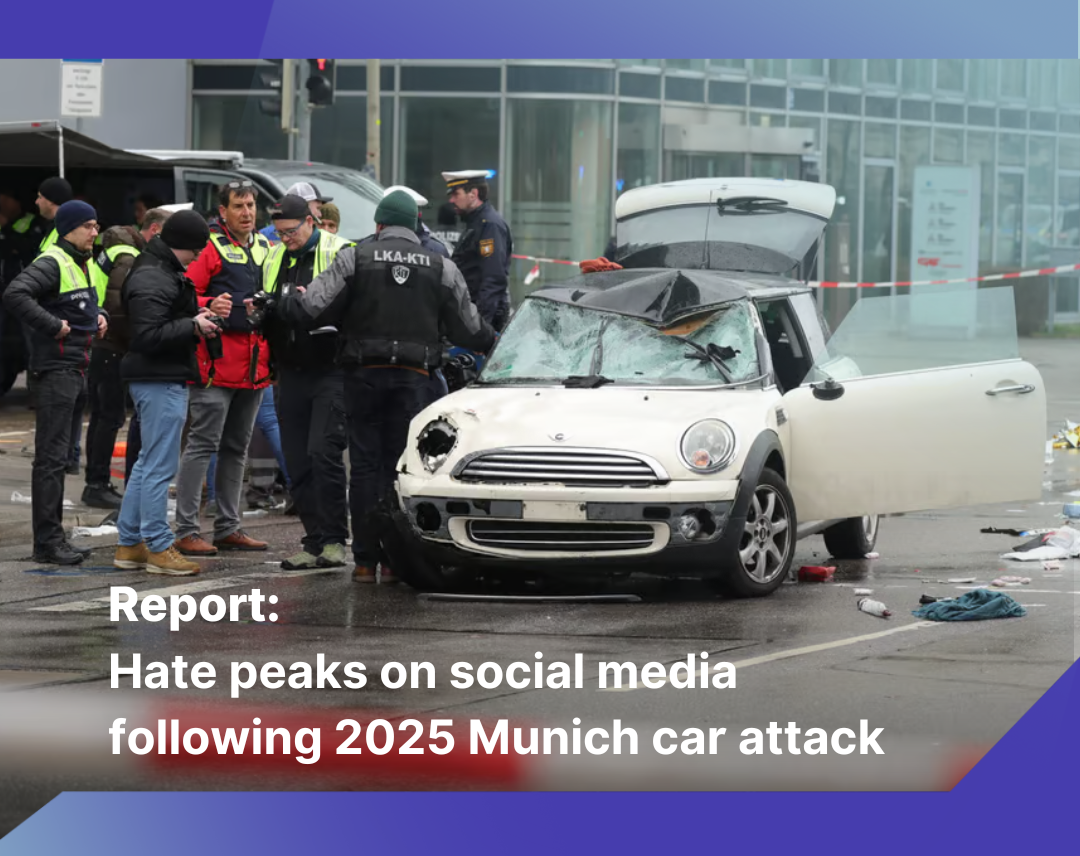On February 13, 2025, during a trade union rally organized by ver.di in Munich, Germany, a 24-year-old Afghan asylum seeker named Farhad Noori drove a white Mini Cooper into the crowd, resulting in 39 injuries. Tragically, a 37-year-old woman and her two-year-old daughter succumbed to their injuries two days later.
This incident has intensified debates around immigration and public safety in Germany, especially with the federal elections approaching on February 23. Chancellor Olaf Scholz and other political figures have addressed the issue, presenting contrasting views on immigration policies and deportation measures.
Recognizing the public uproar following the incident, TrollWall AI has decided to conduct an independent analysis and had analysed nearly 2 million comments from major Facebook pages in Germany over 16 days. Our analysis includes data from all major German news media outlets, such as Der Spiegel, Bild, and Die Zeit, as well as the official Facebook pages of all political parties, such as Christian Democratic Union (CDU), Social Democratic Party (SPD), and Alternative for Germany (AFD), along with their key representatives.
Highest amount of hate detected in 2025
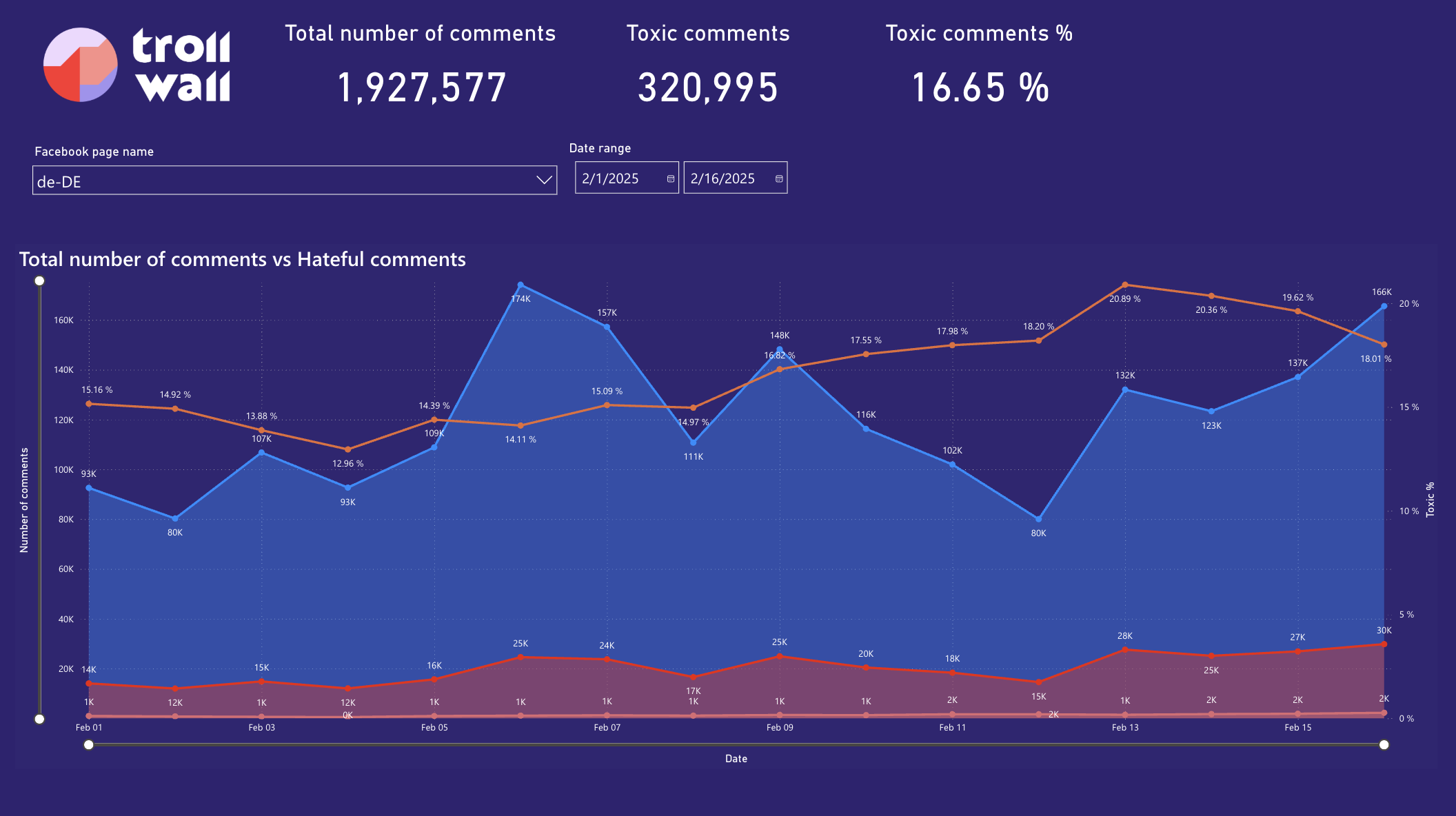 Based on our analysis, February 13, the day of the attack, marks the day with the highest amount of hate detected in Germany to date in 2025. Out of the 132,032 comments recorded on the day of the incident, 27,586 (20.89%) comments were detected as toxic and hateful. We proceeded to deep dive further and identify the top categories of Facebook posts that contribute to this spike.
Based on our analysis, February 13, the day of the attack, marks the day with the highest amount of hate detected in Germany to date in 2025. Out of the 132,032 comments recorded on the day of the incident, 27,586 (20.89%) comments were detected as toxic and hateful. We proceeded to deep dive further and identify the top categories of Facebook posts that contribute to this spike.
Political and online media pages are the top breeding grounds of hate
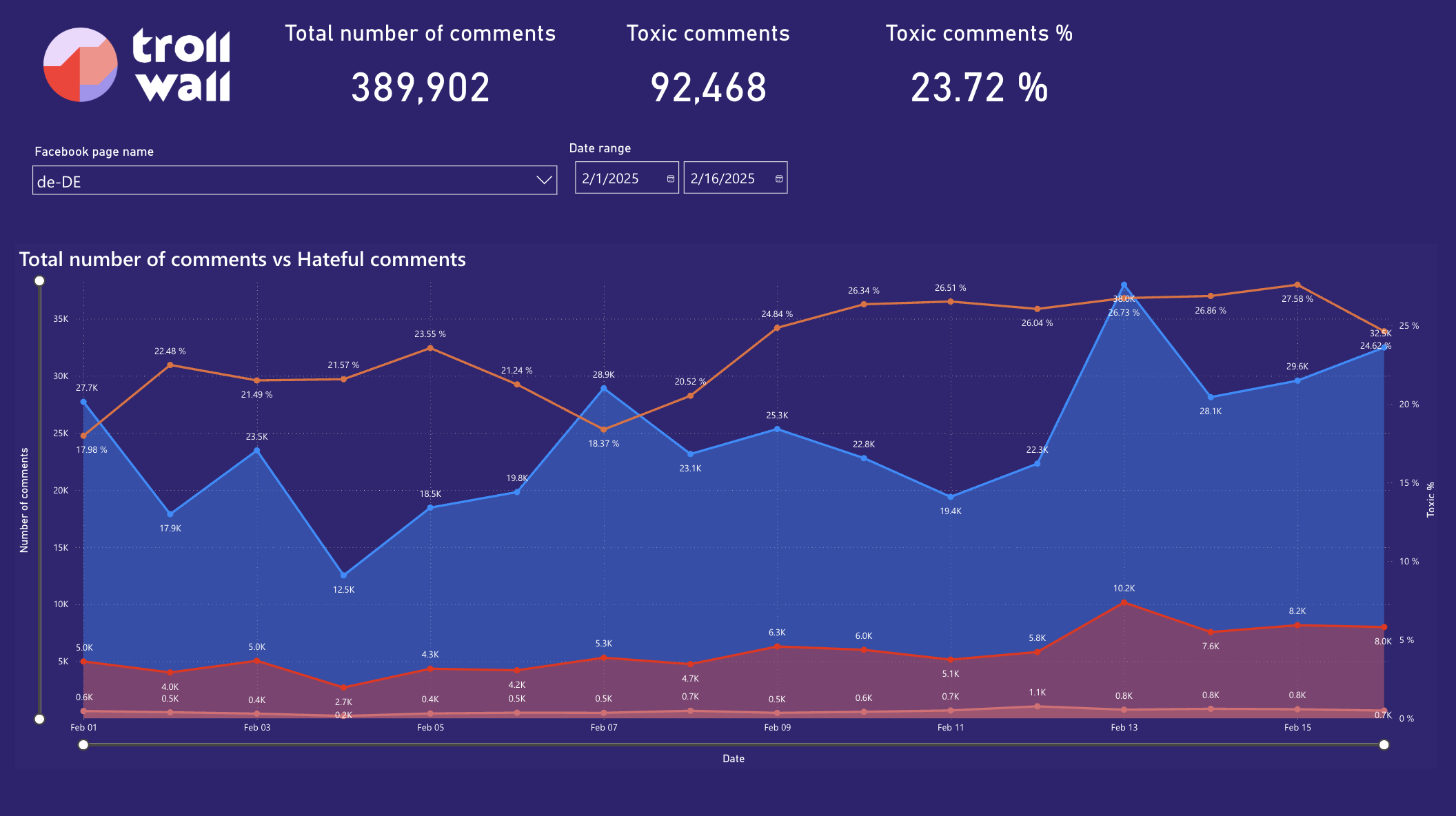 The political pages category, which includes official Facebook pages from all political parties and their representatives is the category that has recorded the highest amount of hate in their comments. The number of comments has peaked on the day of the attack on 13th February at 37,976, of which 10,151 (26.73%) of them are toxic and hateful. Despite the number of comments decreased gradually after the attack, the hate continued to rise and peaked at 15th February. 81,57 (27.58%) toxic and hateful comments were detected out of 29,576 total comments on the day.
The political pages category, which includes official Facebook pages from all political parties and their representatives is the category that has recorded the highest amount of hate in their comments. The number of comments has peaked on the day of the attack on 13th February at 37,976, of which 10,151 (26.73%) of them are toxic and hateful. Despite the number of comments decreased gradually after the attack, the hate continued to rise and peaked at 15th February. 81,57 (27.58%) toxic and hateful comments were detected out of 29,576 total comments on the day.
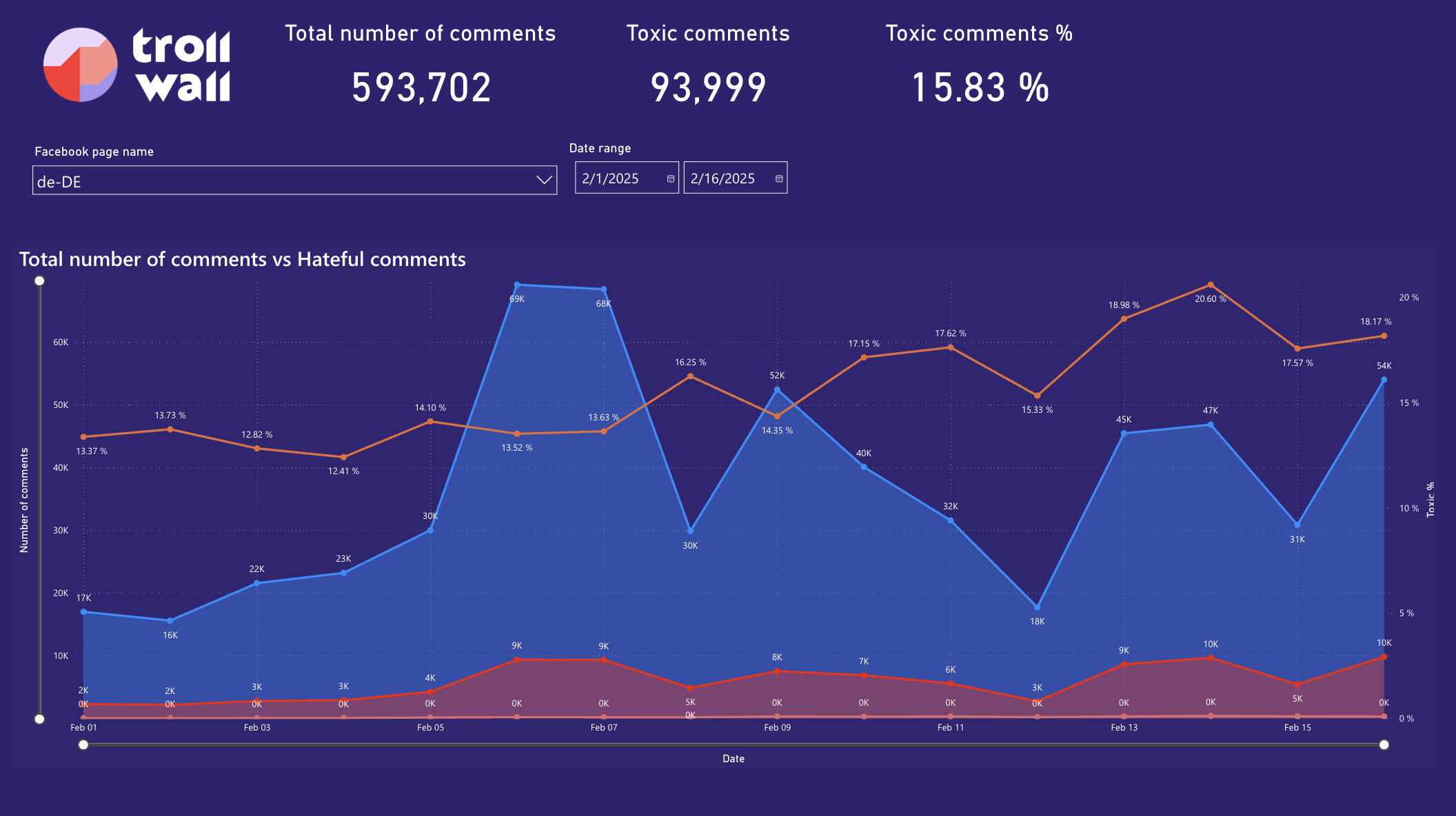 Online media pages have experienced a surge in the amount of comments following the incident. However, despite these surges in volume that occurred before the beginning of the month, the percentage of hate has reached the highest on the day following the incident on 14th February, with 9,648 (20.6%) out of 46,839 comments are toxic and hateful.
Online media pages have experienced a surge in the amount of comments following the incident. However, despite these surges in volume that occurred before the beginning of the month, the percentage of hate has reached the highest on the day following the incident on 14th February, with 9,648 (20.6%) out of 46,839 comments are toxic and hateful.
A stark contrast in reactions on political leaders' pages
Among the posts with the highest amount of hate in the political pages category, we had identified that they were from Chancellor Olaf Scholz and Markus Söder, the Minister-President of Bavaria and the leader of the Christian Social Union (CSU) in Bavaria.
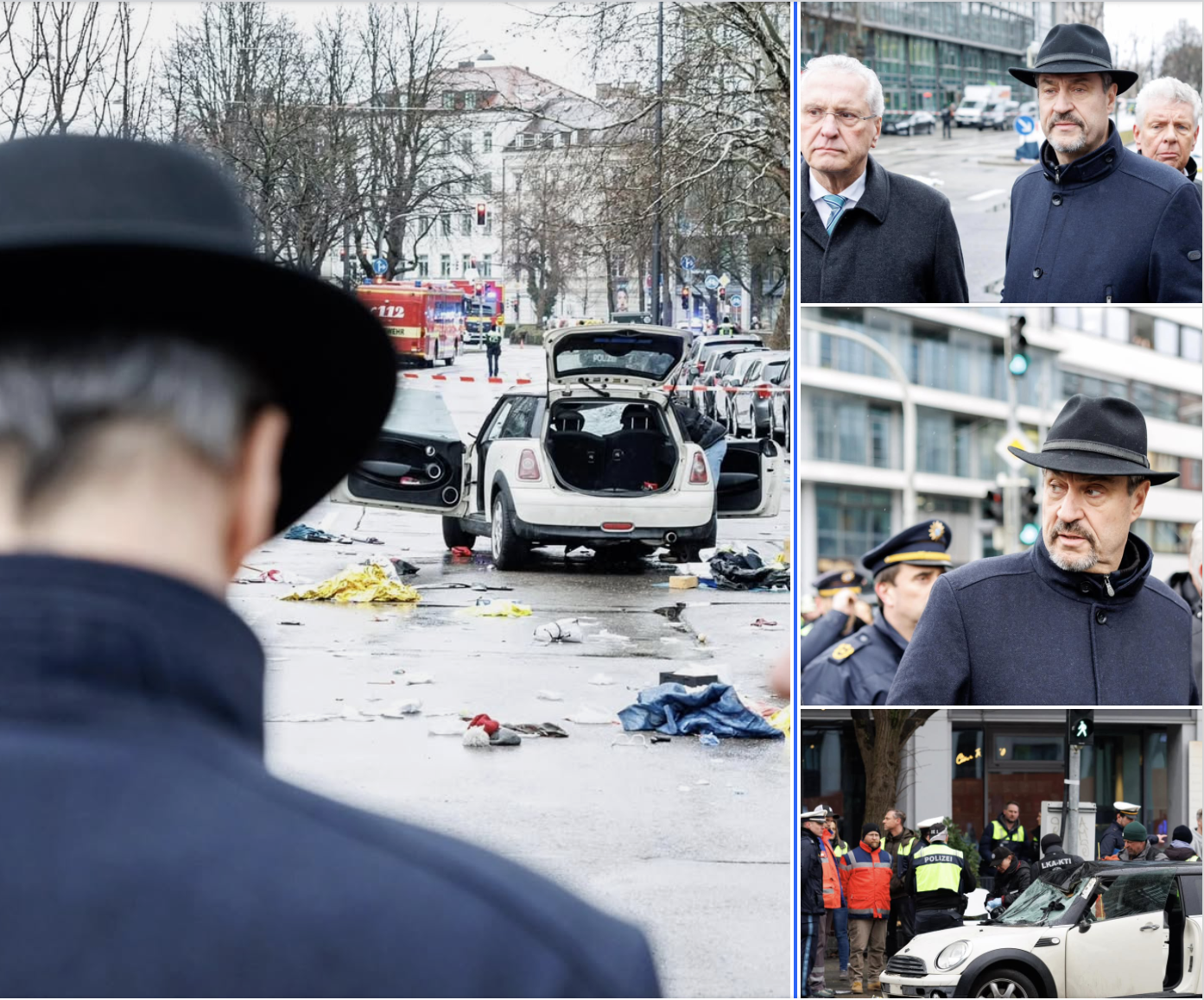 Source: Markus Söder's official Facebook page
Source: Markus Söder's official Facebook page
“Cancer!!! Die sind schlimmer als ein Krebsgeschwür!”
“Cancer!!! They are worse than a cancer!”
“An die Wand und erschießen, anders kann man das Problem nicht mehr lösen.”
“Hit the wall and shoot them, there is no other way to solve the problem.”
“An Ort und Stelle erschiessen, spart Steuergelder!”
"Shoot them on the spot, saves taxpayers' money!
Markus Söder’s post published on 13th February right after the incident has gathered a large amount of hate from netizens, particularly on their opinions against the identity of the perpetrator as an Afghan asylum seeker with ties of Islamist extremist. These comments were directed not only at him, but also at the entire communities, further intensifying tensions surrounding migration policies.
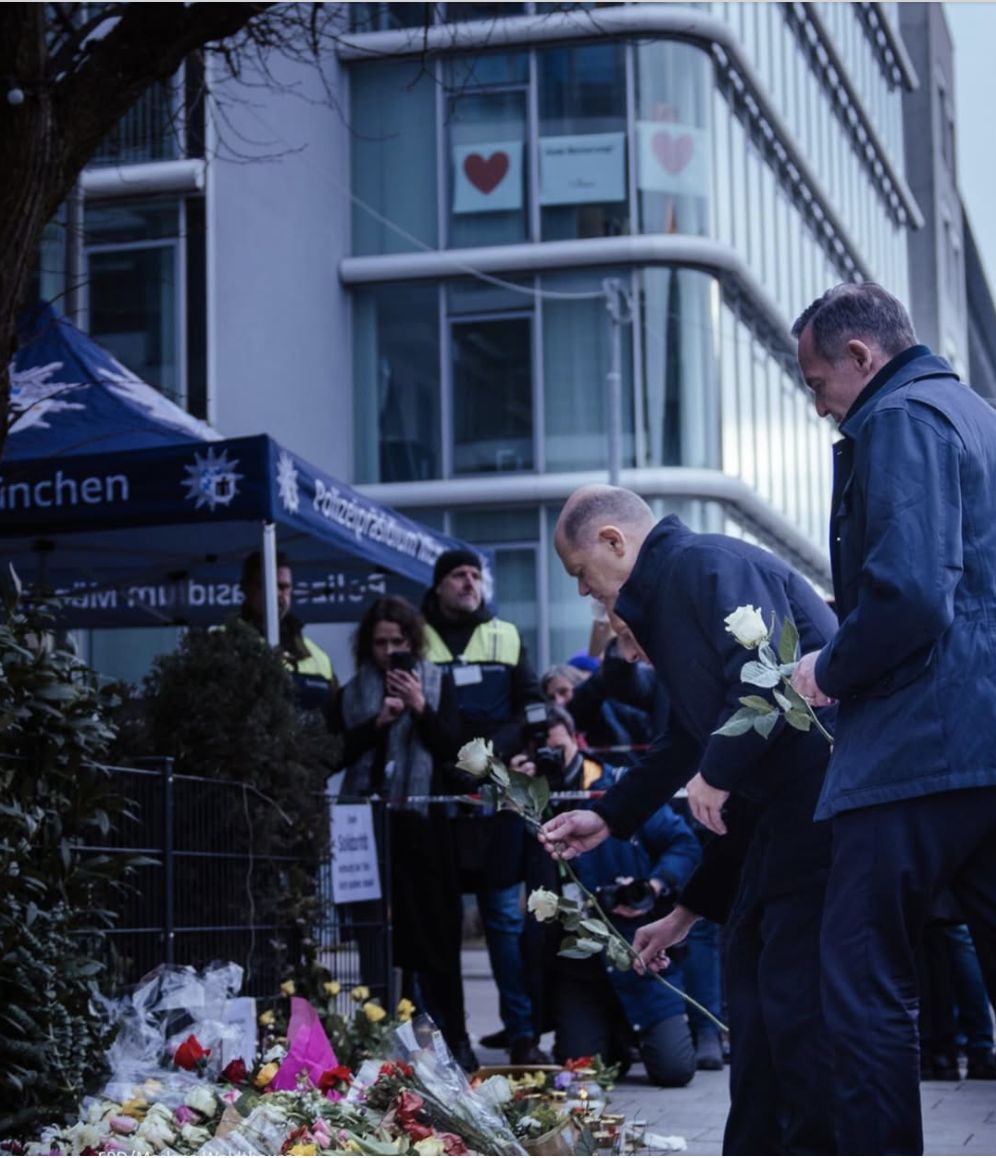 Source: Chancellor Olaf Scholz's official Facebook page
Source: Chancellor Olaf Scholz's official Facebook page
"Alles deine Schuld du dreckiger Hund!"
"It's all your fault, you filthy dog!"
"Sie haben Blut an Ihren Händen – die Farbe passt ja zur SPD!"
"You also have blood on your hands - the color suits the SPD!"
"Ihr gut Menschen ihr badet gerne von Blut von Opfer 🤮 ihr seit das letzte pack 😡🤮 "
"You good people, you like to bathe in the blood of victims 🤮 you are the worst pack 😡🤮"
On the contrary, Chancellor Olaf Scholz’s response to the incident on his page has gathered a huge amount of backlash. Netizens voiced their anger on his response that lacked empathy, and heavily criticized the Social Democratic party and his leadership, and even attacked him on a personal level. This is a stark contrast between Markus Söder post’s comments that were aimed at migrants.
Conclusion
Media companies, organizations, and political figures continue to face significant challenges by relying solely on automated comment moderation by major social media platforms. To prevent their spaces from becoming breeding grounds for toxicity, AI-powered tools like TrollWall AI serves as an essential solution for effective content moderation. By curbing the spread of online hate, such moderation not only helps protect audiences from increasing polarization but also mitigates the risk of real-world violence.
As Germany braces for the upcoming federal elections this weekend, our team at TrollWall AI will continue to monitor online hate and safeguard our German clients' profiles from hateful and toxic comments.
Disclaimer: Analysis is based on the Facebook comments extracted from major media and political pages below:
Media pages:
ARD Mediathek & Das Erste, Arte, Berliner Morgenpost, Big Brother SAT.1, Bild, DW News, Eurosport Deutschland, Hamburger Abendblatt, Hamburger Morgen post, Kabel Eins, PHOENIX, ProSieben, RND - RedaktionsNetzwerk Deutschland, RTL, tagesschau, Vox Dei, ZDF
Political pages:
AFD, Albrecht Glaser, Alexander Graf Lambsdorff, Alice Weidel, Amira Mohamed Ali, Andrea Nahles, Andreas Kalbitz, Annalena Baerbock, Anton Hofreiter, Armin Laschet, Bayernpartei, Beatrix von Storch, Bernd Riexinger, Bettina Stark-Watzinger MdB, Bodo Ramelow, BÜNDIS 90/DIE GRÜNEN, Carola Rackete, CDU, CSU (Christlich-Soziale Union), Die Grünen, Dr. Maximilian Krah, Fabio De Masi, FDP, FDP Fraktion Bundestag, Franziska Giffey, Gregor Gysi, Janine Wissler, Jens Spahn, Johannes Vogel, Julia Klöckner, Katarina Barley, Katja Kipping, Manfred Weber, Marco Buschmann, Markus Söder, Martin Schulz, Olaf Scholz, Ralph Brinkhaus, Renate Künast, Robert Habeck, Sahra Wagenknecht, Sergey Lagodinsky, Sigmar Gabriel, SPD, Susanne Hennig-Wellsow, Tessa Ganserer, Tino Chrupalla
